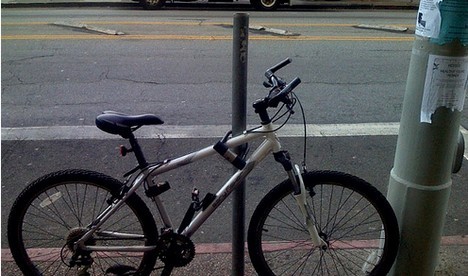
Lloyd reported back in 2007 that the City of Toronto was using bait bikes fitted with GPS to trap would-be bike thieves. Apparently the idea is catching on, and London is now following suit. In fact, British police are going to be deploying bait bikes across the country after a series of successful trials cut theft rates by as much as 45%. All well and good, you might think, but it seems some people are concerned this tactic amounts to entrapment.
As Frederika Whitehead reports over at The Guardian, British police are deploying unlocked and poorly locked bikes fitted with GPS, and then tracking them as they are stolen. The idea is not just to catch the lowly cycle thieves (who are often young kids or junkies), but to track the bikes back to warehouses where criminal gangs often store their collections of stolen bikes before selling them on.
But it seems some people working in rehabilitation are concerned—arguing that leaving a bike unlocked is just putting temptation in the way of the folks they are working hard to help straighten up. A drug treatment adviser at the Home Office told the Guardian:
"There is so much else they can do to prevent bike theft that doesn't involve leaving temptation in the way of drug addicts that we have spent months helping to get clean."
I must admit, I find it hard to get overly concerned about this. Theft is theft. And as Hal the bike mechanic showed when he graded New Yorker's bike locking abilities, it's not like there isn't plenty of temptation out there already. In fact, if you combine a tactic like this, with some prominent signage warning that decoy bikes are being used, you could argue that it will provide an effective deterrent to keep these folks on the straight and narrow.
Aside from any moral qualms about tempting people into theft, I do think the fact that police are deliberately targeting not just the junkies on the street, but the gangs that fund them, is a smart move on their part. Targeting the folks on the lowest rung of the ladder will never stop organized bike theft—but dismantling the infrastructure and hierarchy of the "industry" holds serious promise. To that end, it might make sense to stick with locked bait bikes, not unlocked ones, to better target the professionals, not the opportunists.
As for the drunk student who whines in the article about being caught "borrowing" an unlocked bike to get home from the pub, and who got away with a warning from the police, it's kind of hard to see him as a victim of rough justice.
From Treehugger.com
